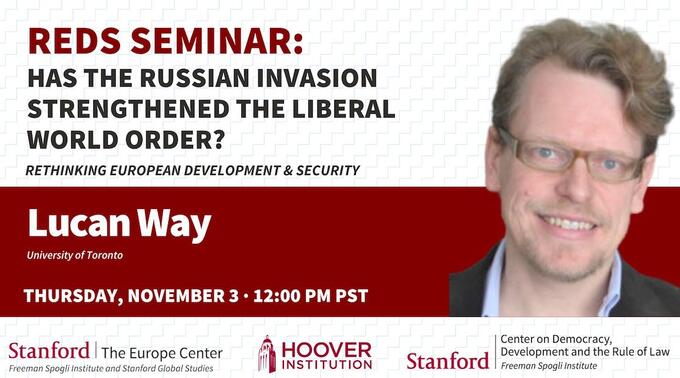Kazakhstan’s Public Opinion and Russia’s War Against Ukraine
How will Russia’s renewed aggression in Ukraine affect Moscow’s relations with its Eurasian neighbors? In a recent REDS Seminar series talk, co-sponsored by CDDRL and The Europe Center (TEC), University of Michigan Professor of Political Science Pauline Jones addressed this broader question in a collaborative study (with Indiana University Professor Regina Smyth) examining Kazakhstan’s public attitudes toward the Collective Security Treaty Organization (CSTO). A Russian-forged security organization composed of Eurasian countries, the CSTO is aimed at collective defense, although its mandate has recently expanded to include the mitigation of internal conflicts.
Kazakhstan’s significance as a case study, Jones explained, is partly derived from its status as a regional hegemon and the largest non-Russian member state of the CSTO. Although some argue that Kazakhstan’s membership in CSTO contributes to interethnic harmony among its dominant ethnic Kazakh population and large ethnic Russian minority, mounting protests against the war in Ukraine, as well as an influx of Russians fleeing Putin’s war, have put pressure on Kazakhstan to leave the organization. Jones’s study of Kazakhstan’s public opinion on the CSTO suggests that popular sentiments matter in shaping foreign policy and that unpopular decisions can undermine support for the ruling party.
Jones’s study relied on both direct questions and a list experiment to gauge Kazakhstani public attitudes toward the CSTO. The question asked interviewees whether they approved of Kazakhstan’s participation in the Collective Security Treaty Organization. The list experiment offered participants a list of policies and asked them how many they agreed with. The treatment group’s list of policies included Kazakhstan’s engagement in the CSTO, whereas that of the control group did not.
Jones’ talk highlighted three main provisional findings. First, popular support for the CSTO is weak. Second, it is divided both across and within ethnic groups, with demographic variables being primary correlates of attitudes. Finally, attitudinal beliefs about Russia seem to reinforce these divides.
Data analysis revealed two primary biases at play. The first is a fear bias, or the reluctance to adopt positions that run contrary to that of the regime. The other is a community preference bias, or an individual’s reluctance to express preferences inconsistent with prevalent views within their own ethnic community. The community preference bias seemed to be stronger, especially for ethnic Kazakhs. That is, ethnic Kazakh respondents were more likely to say that they do not support the CSTO, even when they do, likely out of fear of misaligning with the prevalent view within their own community.
Attitudinal variables also played a role, albeit less so than the demographic ones. Trust in Putin and positive attitudes toward Russia were associated with greater support for the CSTO. In contrast, among those who saw the Ukraine war as the most salient issue facing the nation, support for the CSTO was weaker.
These findings suggest that, in the future, Kazakhstan’s government may face pressure from public opinion to change its policy vis-à-vis the CSTO, and Russia, more generally.
Read More

Professor of Political Science Pauline Jones explored how Russia’s renewed aggression in Ukraine will affect Moscow’s relations with its Eurasian neighbors in a recent REDS Seminar talk, co-sponsored by CDDRL and TEC.















 Oxana Shevel is an Associate Professor of Political Science at Tufts University and current Vice President of the Association for the Study of Nationalities (ASN) and the American Association of Ukrainian Studies (AAUS). Her work explores nation building and identity politics in the post-Soviet region. Her book, Migration, Refugee Policy, and State Building in Postcommunist Europe (Cambridge University Press, 2011) won the American Association for Ukrainian Studies prize for best book in the fields of Ukrainian history, politics, language, literature and culture. Her recent work has focused on the sources of citizenship policies in the post-Communist states, comparative memory politics, and religious politics in Ukraine. With Maria Popova, she is currently writing a book on the root causes of the Russo-Ukrainian war, entitled Russia and Ukraine: Entangled Histories, Diverging States, scheduled to be released in late 2023.
Oxana Shevel is an Associate Professor of Political Science at Tufts University and current Vice President of the Association for the Study of Nationalities (ASN) and the American Association of Ukrainian Studies (AAUS). Her work explores nation building and identity politics in the post-Soviet region. Her book, Migration, Refugee Policy, and State Building in Postcommunist Europe (Cambridge University Press, 2011) won the American Association for Ukrainian Studies prize for best book in the fields of Ukrainian history, politics, language, literature and culture. Her recent work has focused on the sources of citizenship policies in the post-Communist states, comparative memory politics, and religious politics in Ukraine. With Maria Popova, she is currently writing a book on the root causes of the Russo-Ukrainian war, entitled Russia and Ukraine: Entangled Histories, Diverging States, scheduled to be released in late 2023. 






 Diamonds have long been bloody. A new history shows how Germany’s ruthless African empire brought diamond rings to retail display cases in America—at the cost of African lives.
Diamonds have long been bloody. A new history shows how Germany’s ruthless African empire brought diamond rings to retail display cases in America—at the cost of African lives.